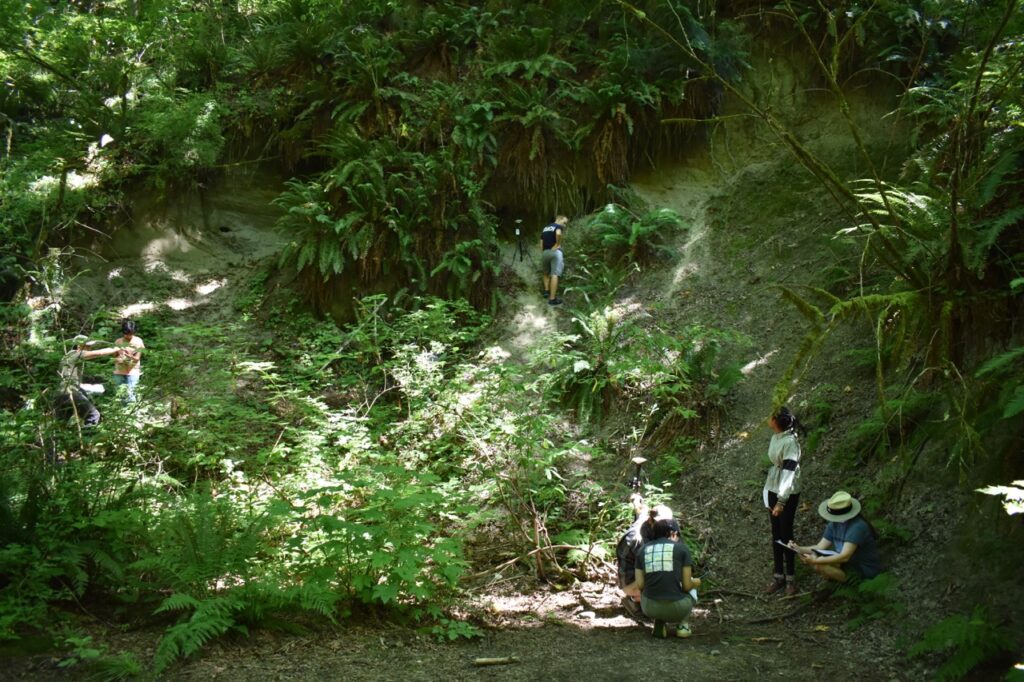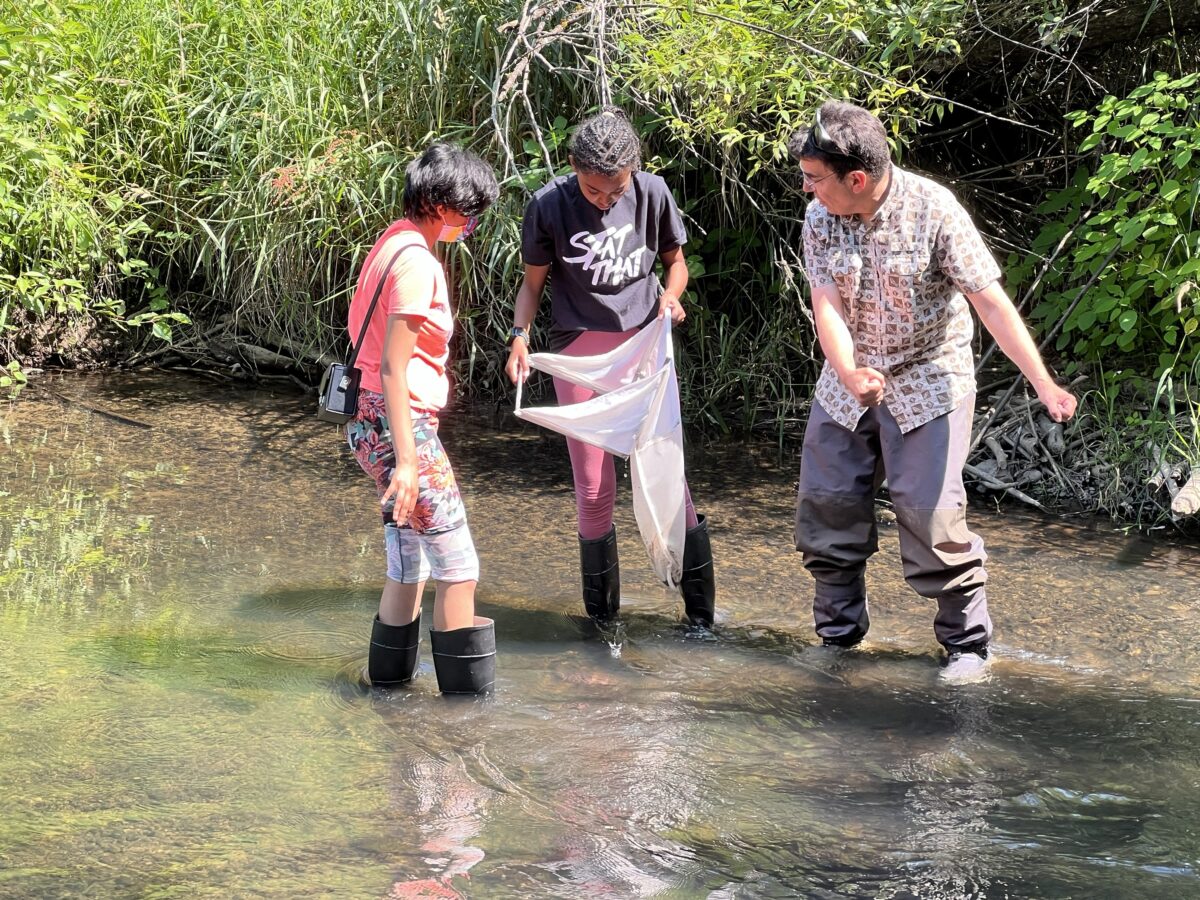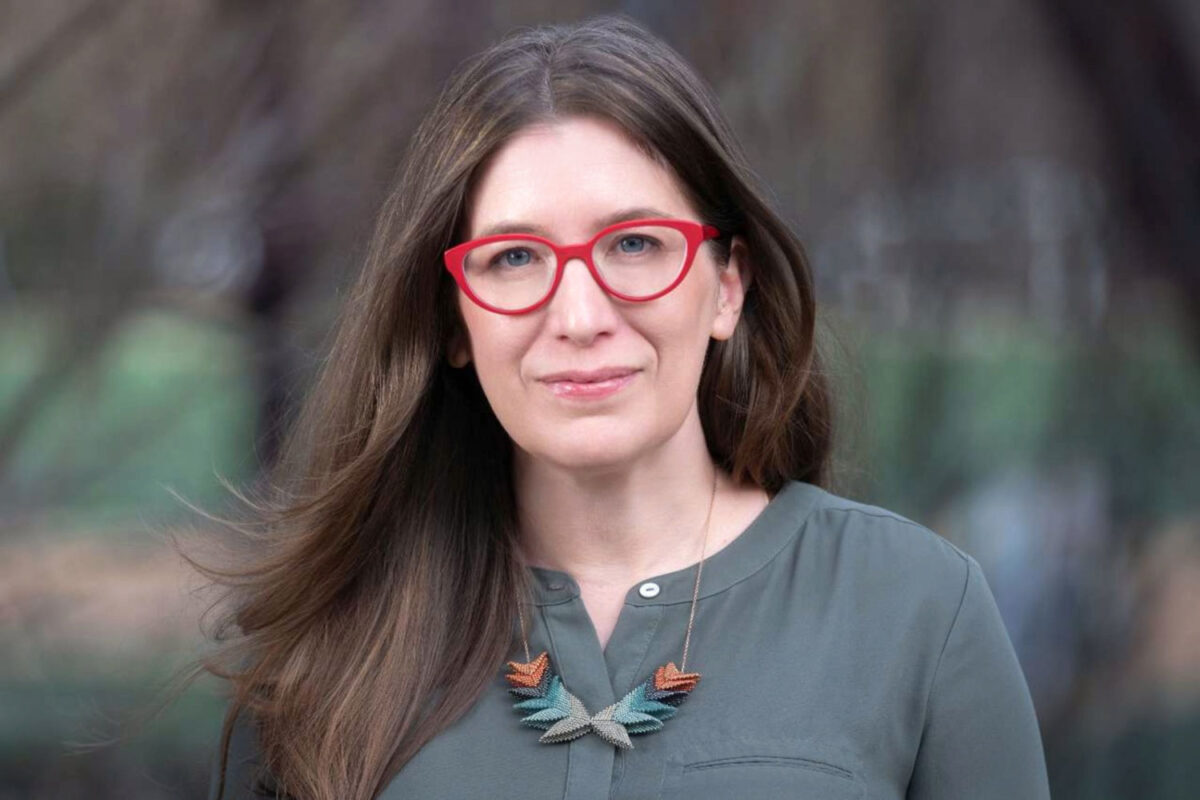Gathering in labs, woods and creeks — and working alongside recent graduates from the University of Washington Bothell — local high school students spent two weeks this summer learning about science and the environment on campus and at the Environmental Education & Research Center at Saint Edward State Park in Kenmore, Washington.
“It’s great for people of any age to understand the history and biology of the area in which they live,” said Dr. Jeffrey Jensen, teaching professor in UW Bothell’s School of STEM. “For young people in particular, this means they will care more about their environment and be more likely to be good stewards.”
This year’s workshop, which covered stream biology, geomorphology and geography, grew out of a similar two-day event Jensen led in 2022 where he instructed students about fish and the history of the watershed, including the presence of Indigenous people now and in the past.
“That was a successful run, and we decided to expand this year to include mapping, geographic information systems and geology,” Jensen said.
The workshops were supported by local partner iUrban Teen, an educational program that brings together underrepresented teens and young adults for career exploration and mentoring.
Local partnerships
iUrban Teen played a key role in the success of the workshops by reaching out into its community to recruit participants. The organization also provided on-site support such as student transportation and food.
Working with UW Bothell faculty, two recent alumni — Megan Williams (Environmental Studies major and Geographic Information System minor, ’23) and Mykyta Skiba (Computer Science & Software Engineering major and GIS minor, ’23) — were also key contributors to this summer’s workshop.
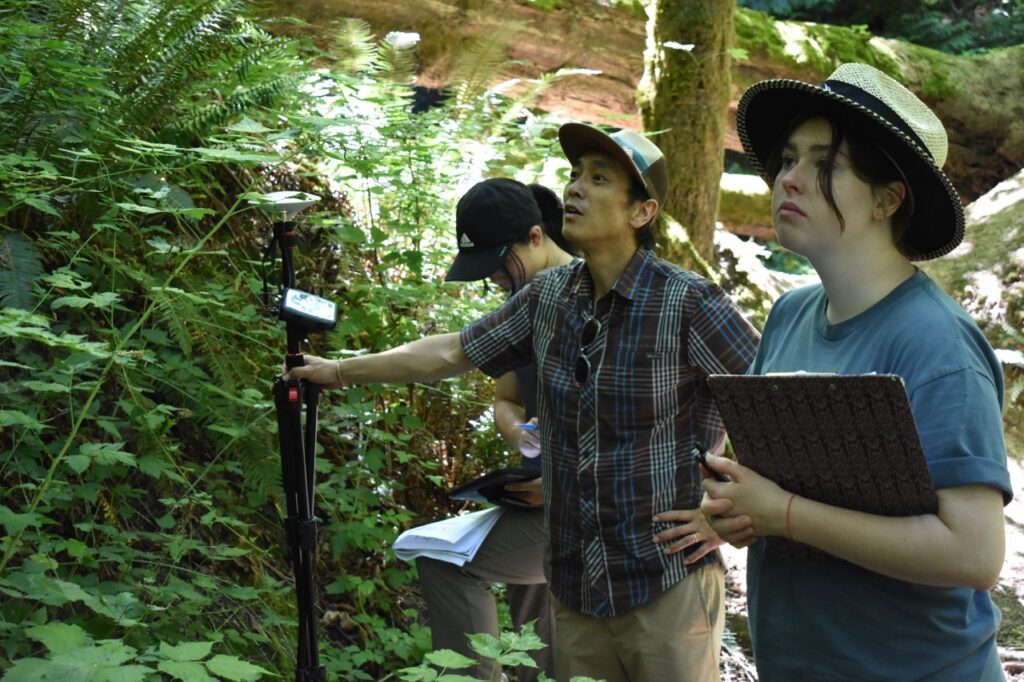
Over the past year as students themselves, they helped develop an interdisciplinary framework for approaching interconnected and complex environmental issues, and then co-designed the workshop’s curriculum and educational materials. During the workshop, Williams and Skiba then acted as mentors for the high school participants, as well.
“We wanted to implement an educational model in which undergraduate students serve as docents and mentors of youth,” said Dr. Santiago Lopez, faculty director of UW Bothell programs at the EERC and associate professor in the School of Interdisciplinary Arts & Sciences. “This is a very effective model that could be transformative for both undergraduate students and youth as they explore potential career pathways and college degree options.”
International connections
The program was also made possible through a 2021 grant from the National Research Foundation of Korea for “An International Comparison Study of Transnational Citizenship and Social Participation Competencies in the Post-COVID Era.”
Leading the research project were Lopez; Dr. Jin-Kyu Jung, professor in the School of IAS; and Dr. Bo Ae Chun, former visiting scholar in the School of IAS and current associate professor at the Department of Geography Education at Catholic Kwandong University in South Korea.
The team project seeks to study community and examine changes in social participation competency and a sense of place though environmental monitoring and education in the two countries.
In line with these goals — and principles of Collaborative Online International Learning — the team has been building partnerships with local and global communities and developing new environmental curriculum.
“It’s a community engagement model that includes both local high school and undergraduate students, as well as global students from the high schools and university in Korea,” Jung said. “It provides an opportunity to engage students in applied environmental research and nature-based learning and, by doing so, gain social participation competency and transnational citizenship.”
And of course, Jung added, students get to have fun while being active outside in natural settings and getting hands-on involvement in their community.
Living laboratory
The high school students were introduced to concepts such as stream biology, hydrology and salmon lifecycles. And their outdoor observations began on the first day of the workshop on the UW Bothell campus wetland where they practiced habitat surveillance and collected samples of macroinvertebrates from North Creek.
The following day, they worked in the lab at the EERC where they used microscopes to get a closer look at the specimens they had collected.
Nestled along the northeast shore of Lake Washington, the EERC opened in 2022 as the result of a partnership between UW Bothell and Washington State Parks. The center is in the former Saint Edward Seminary building that was transformed into a site for the appreciation, research, study and stewardship of Pacific Northwest ecosystems.
“The EERC provides environmentally centered community engagement opportunities,” Jung said. “It gives our diverse students the experience and opportunity to serve in a mentoring role with youth who are often from diverse and marginalized communities. It also acts as a living lab by providing both indoor and outdoor learning opportunities for a wide range of topics.”
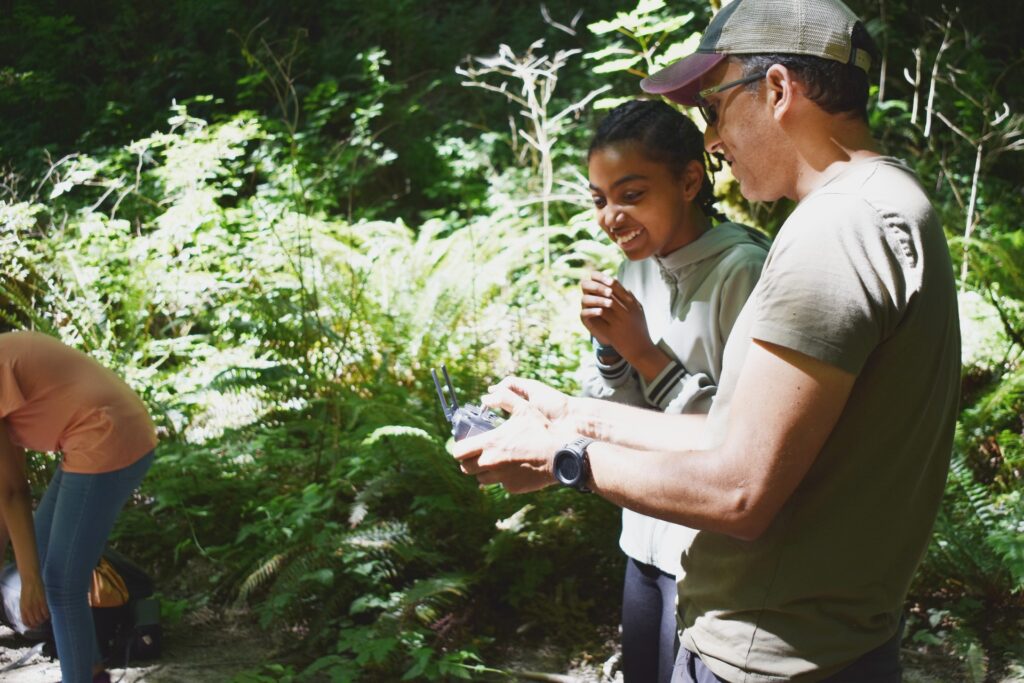
The second week of the workshop, participants went to nearby Denny Creek to learn about local landslides, coastal erosion and other geomorphology concepts. Here, the students got hands-on experience with multispectral drones, hypsometers and other GPS tools.
Each day, the students would also engage via videoconferencing with their South Korean peers, who were completing a similar workshop with a curriculum unique to their area in Gangneung.
Collecting data
The multiple chances to engage in hands-on learning were critical to the program’s design, said Jensen.
“Students are often told how things are done, but it’s less common for students to do their own data collection and analysis,” he said. “The techniques we used are the same used by professional biologists and geographers. I think the students really appreciated that they got to collect data, use nets, fly drones and think about the relevance of the data they were collecting.”
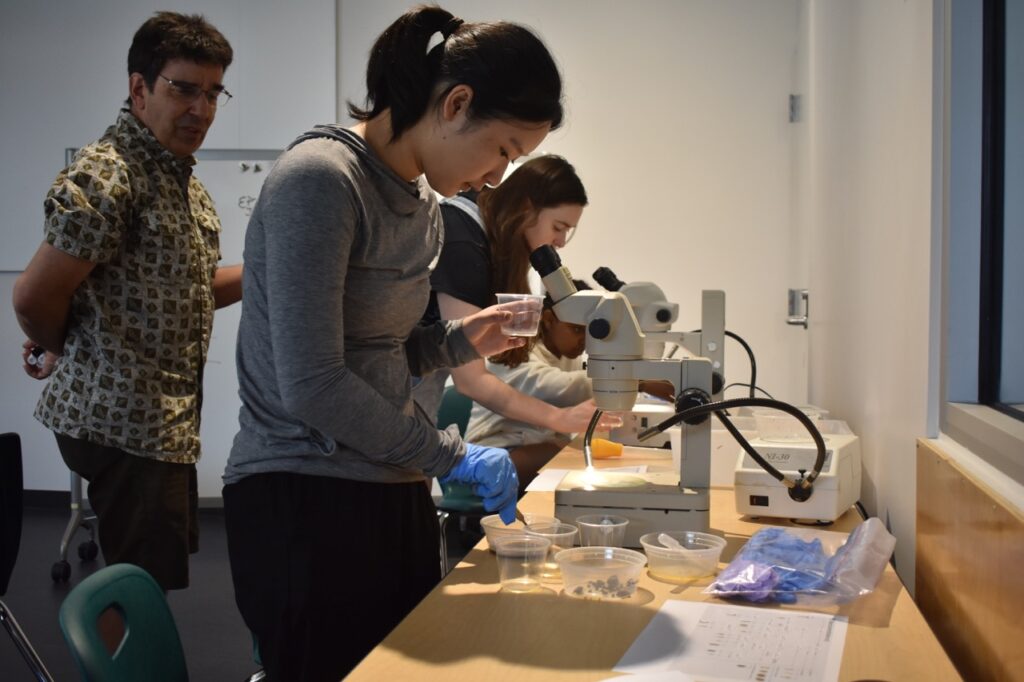
Another goal of developing an environmental workshop for high school students is to give them the opportunity to experience science from a perspective they might not otherwise have until college. It can help spark an interest in topics they may be unfamiliar with and fuel the desire to explore them further.
“Seeing the types of challenges and research that can be done locally gives students a better sense of how their interest in the environment might lead them to environmental careers,” Jensen said.
Spending intentional time in local environments is a powerful part of the program, said Jung.
“The workshop helps the students develop a stronger awareness of, connection to and engagement with various environmental issues,” Jung said. “It also provides them with the ability and capacity to depict, analyze and advocate for solutions to environmental issues.
“For the undergraduate students involved,” he added, “they also learn what it means to actively engage in community environmental issues and activism and to work as mentors for youth.”
It’s a community engagement model that includes both local high school and undergraduate students, as well as global students from the high schools and university in Korea. It provides an opportunity to engage students in applied environmental research and nature-based learning and, by doing so, gain social participation competency and transnational citizenship.
Dr. Jin-Kyu Jung, professor in the School of Interdisciplinary Arts & Sciences
Meaningful memories
The UW Bothell faculty all said they were pleased with the enthusiastic energy and commitment demonstrated by the high school participants, especially when it came to sampling streams, flying drones and talking with their international peers.
“I was really impressed by the level of engagement of the students,” Jensen said. “They had lots of questions and were always quick to get working on activities.”
At the end of the workshop, the students completed a survey where they were asked to share their most memorable or exciting activities. One student said, “Going in the stream to find salmon and the hike to measure a landslide were memorable to me. We had a fun time hiking.”
For another student, it was “learning about different ways to evaluate the health of the environment, such as macroinvertebrates, landslide measurements, soil analysis, invasive species and more, as well as communicating with students in Gangneung, South Korea.”
The highlight for a third student was “walking in the stream and learning about how we can tell how good the stream is based on the insects we saw.”
And all three of these students mentioned that they hope the workshop continues for others and that they also get a chance to participate in similar opportunities in the future.
